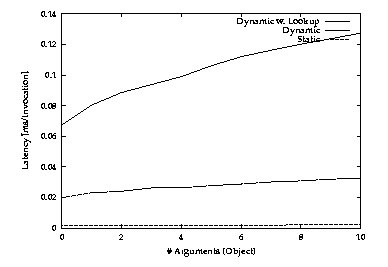

Figure 17 shows the cost of dynamic calls by comparing the overhead of local method invocations with a varying number of arguments (between 0 and 10 objects). These are performed using (1) dynamic invocations, each combined with a method lookup, (2) dynamic invocations without lookups, and (3) static invocations. These tests were made on a SUN ULTRA 60 (SOLARIS 2.6, 256 Mb RAM, 9 Gb harddisk) with JAVA 1.2 (native threads). The test setting did not involve any JUST IN TIME (JIT) compiler. The speedup factor observed for static invocations when using a JIT compiler was over three. The speedup in the case of dynamic evaluation is, as expected, insignificant.
